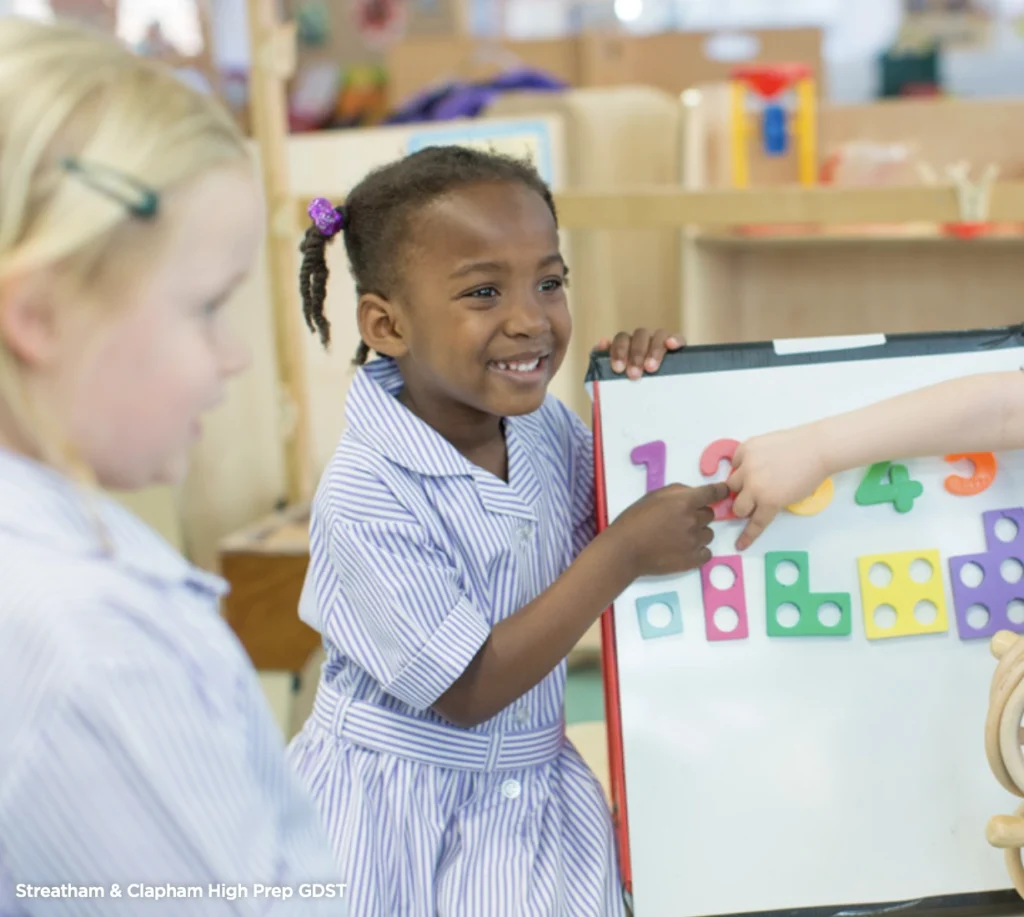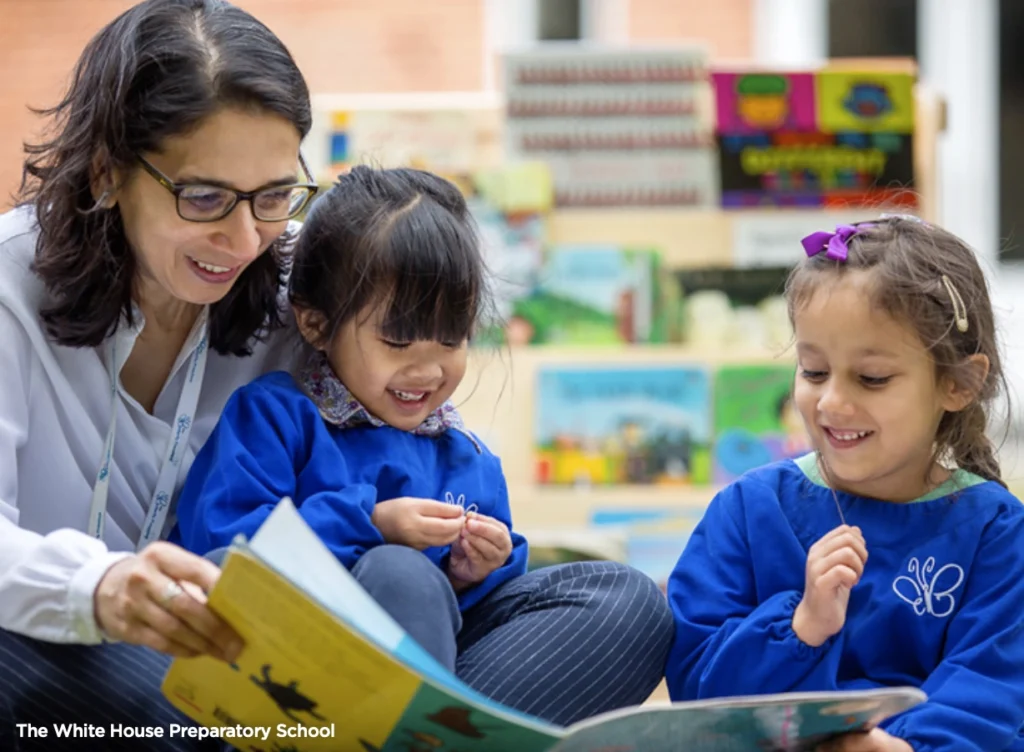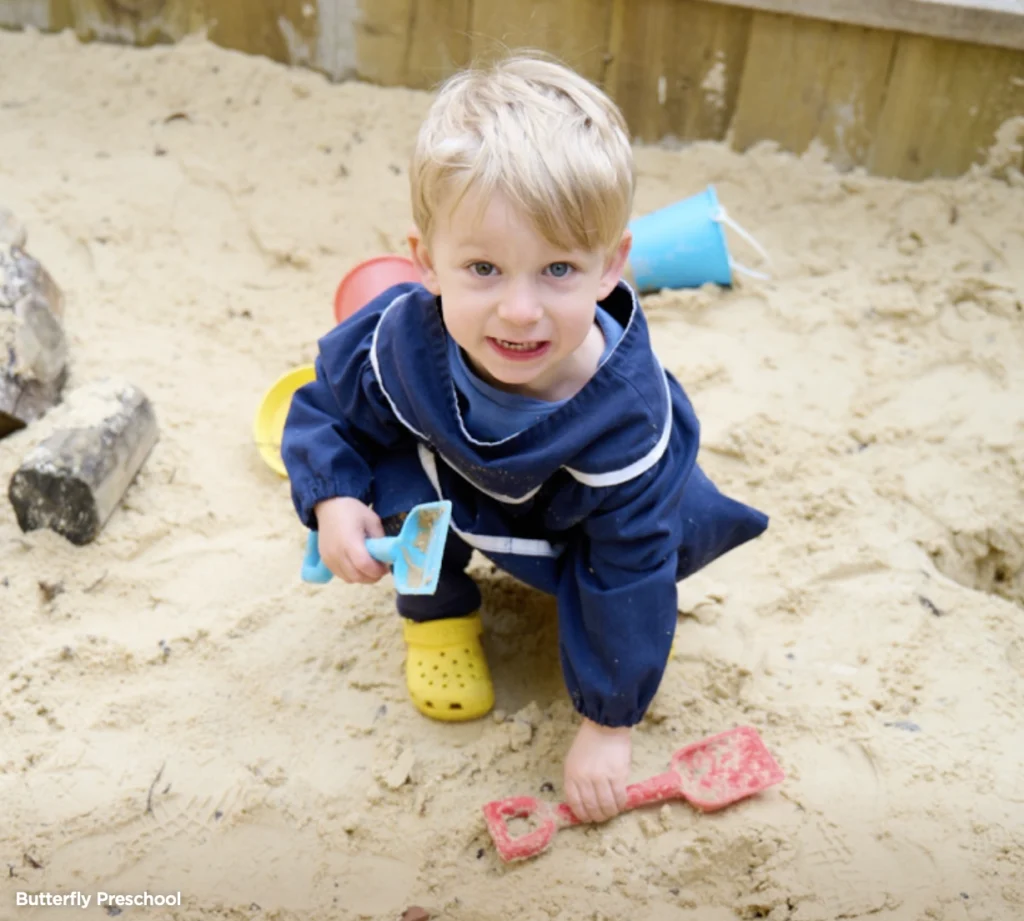21st August 2024 · Latest News
We want children to know that thinking is fun,” says Jo Parker, Head of DUCKS at Dulwich College. “We want them to be inquisitive and inquiry-based learners who develop as critical thinkers. Provoking their curiosity through opportunities of discovery and exploration allows for problem-solving.”
Indeed, the government’s early years foundation stage framework (EYFS) which came into effect on 31st March 2021, has a strong focus on independence and communications – life skills with which pandemic babies have been found to struggle.
A 2023 study by the Royal College of Surgeons in Ireland found that babies born during the pandemic have poorer communication skills because they heard fewer words as they were not leaving their homes. It’s this cohort who are starting at nursery and schools now.

Charlotte Butterfill, Director of Butterfly Preschool explains, “The level of communication that children have is very minimal when they come to us now compared to how it used to be. This could mean there is a lack of stories, talking and communicating in the household and more screens.”
SETTLING INTO NURSERY
Talk about it
This will be one of their biggest transitions to date so let them know it’s happening. The summer before nursery starts, talk about big school, what they will do there and how much fun they’ll have. Walk or drive past it a few times and have a go at the school run. Always mention nursery in a positive light.Settling-in
Most nurseries will do home visits and settling-in periods which allow the child to meet their teacher and get used to the new environment with their secure adult. Back at home, mention the teachers’ names and what they played with at nursery.Say goodbye
Children need to understand that you will be going and then you will come back. It is important that you say goodbye and you don’t just disappear. They may be upset, but any good teacher will be able to settle them down.Hold it together
It is essential not to cry as they will think they are being left forever! Hold it together and then go and find a coffee shop for a shot of caffeine and a cry.Source: Butterfly Preschool
Amy McManus, founder of Little Green Nurseries agrees that children coming to her now are lacking the basic skills expected. “Children are finding it difficult playing with actual toys,” she says. “Toddlers are coming in swiping books rather than turning pages and many don’t like to get dirty.” As such, she has reduced the amount of technology in the nursery and refocused on opportunities to learn basic life skills whilst getting dirty, like planting vegetables or messy play with iced jelly and shaving foam.
Similarly at The White House Prep, the school is introducing ‘Nurture’, an extra-curricular programme focusing on growing the children’s interests outside the classroom.
The aim is to learn practical life skills every Monday afternoon in small groups. This includes community activities such as litter picking, team building skills such as mapping the local area and a mini-architects programme. Teachers will plan the activities according to the children’s interest and exploration. “Our hope is that the children feel secure to communicate in environments different to a classroom setting and further extend their vocabulary as a result,” says Senior Deputy Head, Olivia Palmer.
With this in mind, parents should be looking for a broad and ambitious curriculum with an emphasis on learning through play which fosters independence and curiosity. “Children learn through a play-based approach, meaning that they make links and develop as they engage in a variety of learning opportunities,” says Carly Foulkes, Headteacher at Alderbrook Nursery & Primary School. “Our school values of curiosity, tenacity and collaboration are instilled in our children as soon as they join
our nursery, ensuring they are resilient, independent learners from an early age.”
At Woodentops Nurseries they do this through ‘sustained shared thinking’. This is when children engage in extended periods of play and learning with minimal adult intervention. “We observe a child’s play and know when to be a participant, and when to let them lead. Watching, looking, listening to the communication between them, and thinking about how we scaffold that learning in anything from maths and phonics through to social skills around good listening and concentration,” explains Sarah Sanger, founder and Principal.
Children learn at a different pace and it’s crucial for early years settings to create a welcoming environment that prioritises all children no matter their needs. “It’s our aspiration to ensure that all our girls have excellent foundations in place, which then gives them an accelerated start into life in Reception, but all children develop at totally different stages. Therefore, we try to be bespoke in terms of what we are delivering,” says Helen Loach, Head of Prep at Streatham & Clapham. Children here can do French, music, drama, art, PE, Mandarin, coding and more in a formally structured timetable if they are ready for it and if not, then they have a curriculum that is more suited to them.
Children who enter primary school with a solid foundation in early literacy are better equipped to engage in classroom activities

This personalised approach means that most girls start to read and write by the time they start Reception. However, parents are still underestimating what is expected of their children when they start school, warns Butterfly Preschool’s Butterfill. “Children should know all their phonics, recognise their numbers from one to ten and quantify them.”
BEING COMFORTABLE, HEALTHY OR HAPPY
Wellbeing, kindness and resilience are in the sedimentary layers of our curriculum and several core aspects of our ethos have been in place since the school was founded.
Love for one another comes from a place of respect and tolerance where we celebrate differences in backgrounds, beliefs and identities. Having wisdom as a child is crucial, and when we own our knowledge, we have a better sense of self-assurance and self-care to tackle problems, understand the feelings of others and take action. Similarly, recognising our mistakes or challenges enables us to confront them, allowing positive thought which helps us make progress.
These life skills sit within the curriculum, paving the way for independence in work, mind and thought so that critical thinking comes with much greater ease. Children are comfortable challenging each other, asking questions and developing their sense of agency.
Source: Dolphin School
Recognising that parents are children’s first educators, Butterfill supports them with learning at home through simple tasks such as colouring in the lines for motor skills, practising writing names, reading and sounding out words.
Children who enter primary school with a solid foundation in early literacy are better equipped to engage in classroom activities, follow instructions and participate actively in learning. “At Dolphin, early literacy skills develop quickly due to the well-structured phonics programme, enabling children to develop secure pre-reading and writing skills,” says Adam Woodcraft, Early Years Co-ordinator. “Children make excellent progress due to the rigorous assessment process that highlights areas of strength and weakness and identifies children’s next steps.”

Another outcome of the pandemic is that parents are much more anxious about what to expect in terms of development and education. As such, many nurseries are providing regular parent workshops with external experts, and an open-door policy so parents can consult with teachers at any time for parenting advice, from eating greens and behavioural concerns at home to applying for and even appealing primary school offers as well as issues that impact the community. The White House recently hosted a parent workshop about anti-racism
in the Early Years. At Little Green Nurseries, McManus describes it as a triangle, “So here, we stick to the triangle: happy parents, happy children, happy staff.”
PLAY-BASED ASSESSMENTS FOR 4+
- Focus and listening: Read to your child, pointing to the words, and asking them questions on the text including what it means and what might happen next
- Collaboration and kindness: Practise please and thank you. Play games that involve collaborating and sharing. Try Cupcake from Orchard Games or do craft projects together
- Spatial reasoning: Jigsaws are ideal and try Smart Games too – Bunny Boo is excellent
- Critical thinking: Sorting and classification exercises; see how many ways you can divide up toys into characteristics like eye colour or animal type; try memory games too
- Perseverance: Make sure that games are difficult and keep your child motivated to finish. Don’t be afraid to make a game impossible!
- Talking: Ask your child to draw pictures and then talk about them.
Source: Mentor Education
“People say parents are partners, but no, they are family to us,” exclaims Bedrie Beytula-Sali, Area Manager at Eveline Day and Nursery Schools. “We send our monthly planning and celebration calendar to parents, and they put their own special occasions in there. We do cooking, dancing and dressing up from every part of the world, celebrating everything about the child. Our four-year-olds can say hello and goodbye and count in different languages. I can’t tell you how many of our parents are beyond happy about this.”
Preparing for school is another key issue and while nurseries and pre-schools work with children to become confident learners much of the anxiety comes from the parents. Kristie Dodd, Marketing and Events Manager at Little Barn Owls Forest & Farm School Nurseries explains, “The anxieties stem from parents having less communication with schools; when Covid hit, parents didn’t have the opportunities to fully engage. Children going to school in this cohort are Covid babies, so the attachment is there. It’s a lack of understanding that we’re trying to bridge through our parent workshops.”
Moreover, the aim of school preparedness isn’t just to focus on reading and writing but rather to ensure the children are confident and independent learners. Kerry Smith, Head of Learning at Little Barn Owls adds, “We weave phonics and numbers into our inquiries when working on a project. We had a child who wanted to be a builder, so he worked with our artist to make a woodwork car and in the process measured and wrote down which tools he was going to need, and then wrote down how he was going to do it.”
Parents should also look closely at the management. Woodentops’ Sanger advises, “Parents should be looking for a head of nursery or a nursery manager who makes them feel unique. They should give you the feeling that they listen, that they welcome you, that they understand you and they’re there to support you. That is also going to tell you how that leader approaches the management of the team; if they’re a good listener, they’re probably going to be great with the staff.”
Eveline Drut, Director of Eveline Day Nurseries agrees, “Staff have got to be loved and love those children.” At Eveline the staff are considered family and in London where the cost of living is making it expensive for teachers to live, a nursery that can retain experienced managers as well as hire and train new staff is a winner.
Parents should ask about staff qualifications as well as ratios and specialist teachers. Some early learning settings will be operating off-ratio, which means they have more staff than the required staff-to-child ratio, so they can be more agile in offering specialist learning. At The White House, two trained ‘Emotional Learning Supports’ who are additional to the Specialist Educational Needs and Disabilities Co-ordinator (SENDCo) come into class to support children who may be struggling with friendships or having trouble communicating. Many nurseries and early learning settings will also have specialists come in for sports, dance, mindfulness and languages. At Little Green Nurseries, being off-ratio means McManus can often accommodate last minute pleas from parents for an extra day or half day at nursery.
Staff training is key. Some early learning settings will be progressive in how they teach. For example, Woodentops is collaborating with Oxford University in the ONE Project looking at the different ways to teach maths in early years. Some will do a lot of in-house training – at Eveline staff across the seven nurseries regularly share knowledge with each other, and at Butterfly Preschool all the staff are trained in first aid as well as holding a range of teaching qualifications.

Facilities and outdoor learning are very important but that doesn’t mean that everything must be state-of-the-art. Questions parents should be asking are, is there access to an outside space? Is there forest learning? Are children taken out on trips to museums and landmarks as well as to the local library or supermarket? Are the community invited in? Butterfly’s founder, Butterfill warns to look beyond the facade, “Parents now are of the Instagram generation where everything has to look amazing, but that comes at a huge price, and I would much prefer to have amazingly qualified teachers who are looking after these children than the latest expensive community play chair.”
This year funding is key. As well as a cost-of-living crisis hitting parents, early year settings are under immense pressure with rising costs, government underfunding and a drop in the birth rate in London. As such, many nurseries are changing their funding structures to make places more accessible to parents. Parents should speak to nurseries to see if they can offer the government funding, if they are eligible and whether they accept childcare vouchers.
OUTDOOR LEARNING AND THE BAREFOOT APPROACH
Outdoor learning can consist of a variety of opportunities, from forest school sessions and trips to simply just taking learning outside.
For babies and toddlers especially, being outdoors can enhance physical skills, emotional wellbeing, and an understanding of the world around them. Throw in the barefoot approach and you can reach new levels of outdoor exploration!
Babies’ early understanding of the world is made up of what they can see, hear and feel. To allow them to explore the world around them freely, simply without shoes or socks can open up a wealth of new understanding. The ability to risk assess one’s own environment usually doesn’t come until later in the early years but imagine being able to understand the sense of ‘hard’, ‘bumpy’, ‘soft’ and ‘cold’ underfoot from your very first steps, and therefore move forward with more knowledge and understanding of the world around you.
Source: Little Barn Owls Forest & Farm School Nurseries
Many nurseries are also being more flexible in offering part-time places so that more children have access. Streatham & Clapham offers payment plans and financial assistance based on the family income and Eveline offers sibling discounts, as well as helping parents apply for government grants and special needs entitlements to ease the financial burden.
Pre-nurseries, nursery schools, forest nurseries, childminders, playgroups and daycare – there is an abundance of options for parents, but the most important thing is the feeling parents get when they visit.
Many nurseries are also being more flexible in offering part-time places so that more children have access
“Parents should feel an immediate sense of belonging and trust that fundamentally, when they leave their child in the morning, they are going to be utterly happy within the environment that they are experiencing,” concludes Streatham & Clapham’s Loach. If so, then together they can give children a great head-start on life.

What am I entitled to?
All families in England are entitled to 570 hours of free childcare or early education per year, which is usually taken as 15 hours per week for 38 weeks. Working parents of three-to-four-year-olds, where both parents are each earning less than £100,000 pa, are also eligible for a further 15 hours, so a total of 30 hours.
Working parents of two-year-olds where both parents are each earning less than £100,000 pa, can also access 15 hours childcare support.
From September 2024
15 hours childcare support will be extended to eligible working parents of children from the age of nine months.
By September 2025, most working families with children aged between nine months and five years old will be entitled to 30 hours of childcare support.
Depending on your provider, these hours can be used over 38 weeks of the year (during school term time), or up to 52 weeks if you use
fewer than your total hours per week.
In addition, there is a Tax-Free Childcare account – the government pays £2 for every £8 you pay your childcare provider. More info at: www.childcarechoices.gov.uk
Free education nursery providers
Those offering free nursery education for three- and four-year-olds include maintained nursery schools and primary school nursery classes; private nurseries offer the 15 (some
30) free hours as above.
When to apply
Closing date for applications for nursery places in maintained primary schools for entrance in September 2024 was in February 2024. Each year follows a similar timeframe. More info at www.childcarechoices.gov.uk
The Early Years Foundation Stage (EYFS)
The EYFS is how the government and early years professionals describe the time in your child’s life between birth and five-years-old. Nurseries, pre-schools, reception classes and childminders registered to deliver the EYFS must follow a legal document, the Early Years Foundation Stage Framework, which sets out: the legal welfare requirement that all those registered to look after children must follow; the seven areas of learning and development to guide professionals’ engagement with your child’s play and activities; assessments of your child’s progress; Early Learning Goals – the expected levels your child should reach at age five; and the written details the professionals should give you at age two and age five.
More info at: www.foundationyears.org.uk

